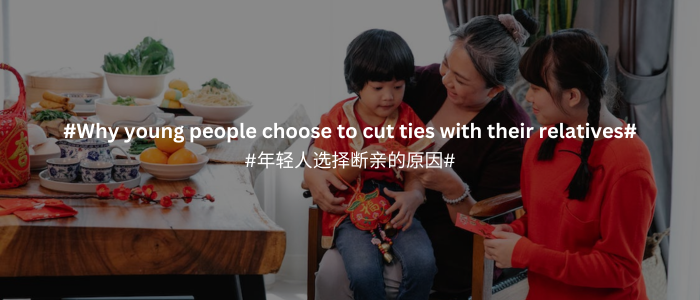In recent years, the term “cutting off family ties (断亲)” became a buzzword on Chinese social media primarily due to various stressors, including the economic downturn and heightened social isolation for a prolonged pandemic. Due to a recent incident surrounding a severely depressed Chinese girl who a doctor advised to break off all contact with her family members, Chinese netizens started a heated discussion on Weibo in the first week of November as to #the reason why young people choose to cut ties with their relatives# (年轻人选择断亲的原因), which garnered over 17 million views.
Download our report on the She Economy in China

Unraveling the root of disconnection among young Chinese
According to a survey conducted by Hu Xiaowu, an associate professor at Nanjing University on the growing trend of cutting off family ties among young Chinese people, the younger the respondents, the less they maintain contact with relatives. Moreover, the survey respondents under 18 years old revealed they barely have any contact with their relatives. As Hu highlighted in his research, there are more profound underlying factors contributing to this phenomenon. These factors include the nearly 36-year-long one-child policy in China and the urbanization resulting from the rapid economic development in the country in the past few decades.
Chinese netizens’ arguments on cutting ties
On a positive note, the emphasis on rationality due to societal advancement may lead to indifference among individuals. It can also be viewed as a gradual awakening of individuality and autonomy, particularly among the youth in China, on a spiritual level.

The potential business implication of this phenomenon
The phenomenon of individuals cutting ties with their families in China can have significant business implications across various sectors. In terms of marketing and content strategies, companies must be aware of the cultural shifts that emphasize rationality and individuality. To effectively engage with this audience, businesses can adapt their content and marketing approaches to resonate with these changing values, addressing the emotional and psychological needs of their target market.
In the real estate and housing sector, the trend of family estrangement resulting from urbanization and evolving family dynamics can influence housing preferences. Developers and real estate businesses need to consider the potential impact on the market. For instance, individuals seeking more independent living arrangements may become a growing demographic. This shift in housing preferences could lead to opportunities for the development of housing solutions. It includes catering to the changing needs and preferences of those who have distanced themselves from traditional family structures. Adapting to these changes and providing housing options that align with these evolving lifestyles can be a strategic move for real estate developers in the Chinese market.
What to learn from the phenomenon of “cutting off family ties”
- The rise in Chinese individuals cutting off family ties is a notable trend. It was influenced by factors like economic challenges and social isolation.
- Younger people, especially those under 18, are increasingly distancing themselves from relatives, driven by historical policies and urbanization. Chinese netizens see this as a reflection of the growing emphasis on rationality and individuality, particularly among the youth.
- This trend has business implications, affecting marketing and real estate. Businesses should adapt marketing to resonate with changing values. In real estate, developers can consider the housing preferences of those distancing from traditional family structures. For instance, offering housing solutions for independent living.





